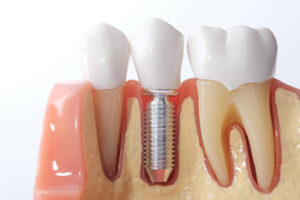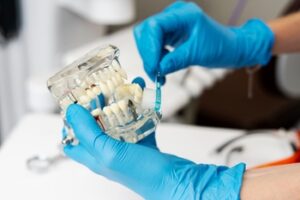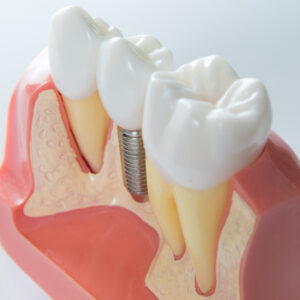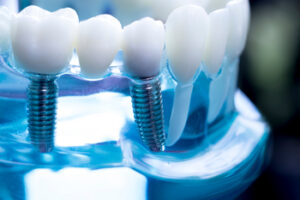Introduction
The journey to improved oral health often leads many to consider dental implants, a revolutionary solution for replacing missing teeth. Dental implants, designed to mimic natural teeth, involve a surgical or invasive procedure where an artificial tooth is anchored into the jaw bone. This not only restores the appearance of a full set of teeth but also prevents bone loss and supports overall dental health.
In this article, we focus on the financial aspect of dental implants, addressing a common question: how much do dental implants cost? The dental implant cost encompasses a range of factors, from the type of implant – like mini dental implants or regular dental implants – to the complexities of the implant procedure itself. We will examine dental implant costs in different scenarios, including single dental implant costs and the price range for full-mouth dental implants.
The article will also explore how dental implants vary depending on additional dental procedures such as bone grafting, tooth extraction, and treatment for adjacent teeth or gum disease. Furthermore, we’ll look into how dental care varies depending on geographic location and the role of dental insurance in mitigating the high cost of dental procedures like implants. Whether for a single tooth implant or more extensive implant treatment, understanding the cost dynamics is vital for anyone considering this form of cosmetic dentistry.
Understanding Dental Implants
Dental implants are a high-quality solution for tooth replacement aimed at restoring both the function and aesthetics of natural teeth. Each dental implant comprises a metal post, typically made of titanium, surgically inserted into the jawbone, acting as a root for an artificial tooth or crown.
Dental Implants Types

Dental implants are a revolutionary solution in implant dentistry, offering a range of options to replace missing teeth and restore oral health. The most common types of dental implants are endosteal and subperiosteal.
Endosteal implants are the most widely used type. They suit most patients and involve placing a screw-like post directly into the jaw bone. This type of implant requires a healthy jaw bone for successful implant placement and is often used in place of bridges or dentures.
Subperiosteal implants, on the other hand, are placed under the gum but on or above the jawbone. This option is ideal for patients who do not have enough healthy jaw bones and cannot or do not want to undergo a bone grafting procedure.
Mini dental implants are smaller than regular dental implants and are used primarily for stabilising lower dentures. They are less invasive, with a reduced dental implant cost and shorter recovery time.
The cost of dental implants varies depending on the type chosen and the complexity of the dental implant procedure. Other factors influencing dental implant costs include the number of missing teeth, the need for additional procedures like bone grafting, and the geographical location of the dental professional.
Patients considering dental implants should consult an appropriately qualified health practitioner to discuss the best tooth replacement options for their needs. A personalised treatment plan, considering factors such as oral health, the condition of the jaw bone, and dental implant costs, can significantly improve the procedure’s outcome.
Advantages of Choosing Dental Implants
The decision to opt for dental implants is often influenced by their long-term benefits, which extend beyond mere tooth replacement. These benefits underscore the value of dental implant treatment despite the initial cost of dental implants being higher than some alternatives.

- Preservation of Oral Health: Dental implants are crucial in maintaining oral health. They prevent the jaw bone from deteriorating, a common issue with missing teeth, and help preserve the natural structure of the mouth and face.
- Long-Term Durability: One of the most significant advantages of dental implants is their durability. Made from high-quality materials, dental implants are designed to last many years, often a lifetime, reducing the need for future dental procedures.
- Comfort and Convenience: Dental implants eliminate the discomfort and instability associated with dentures. They provide a permanent solution that feels and functions like natural teeth, allowing for normal eating and speaking.
- Aesthetic Benefits: Dental implants look and feel like natural teeth, offering a natural and appealing aesthetic. This can greatly enhance a person’s confidence and self-esteem.
- Versatility: Dental implants offer versatility in dental care, suitable for various situations, from a single tooth implant to full mouth restoration. They can be tailored to meet individual needs, making them a preferred choice for various dental conditions.
The benefits of dental implants, including improved oral health, long-term cost-effectiveness, comfort, aesthetic appeal, and versatility, make them a superior choice for tooth replacement.
Factors Influencing Dental Implant Costs
The journey to improved oral health often involves dental implant treatment, a major dental procedure that can vary in cost. Several factors influence how much dental implants cost, including the materials used, the location of the treatment, the dentist’s expertise, and the complexity of the patient’s dental condition.
Material Costs: The choice of material for dental implants, such as titanium or zirconia, is a primary factor in cost determination. The use of high-quality materials ensures the longevity and effectiveness of the implants but also adds to the expense. Furthermore, the cost varies between different types of implants, such as single-tooth implants, full-mouth dental implants, or implant-supported bridges.
Geographic Location: The cost of dental implants can significantly differ based on geographic location. Prices in major cities or affluent areas tend to be higher. Additionally, national dental fee surveys show that dental implant costs can vary from one country to another, prompting some patients to consider dental care in different regions or countries.
Dentist’s Expertise: The expertise and qualifications of the dental professional performing the dental implant procedures are critical. Dentists with extensive experience in implant and cosmetic dentistry procedures may charge more, reflecting their expertise in ensuring successful outcomes, especially in complex cases involving bone grafting procedures or treating tooth decay.
Complexity of the Dental Condition: The patient’s specific dental condition also impacts the cost. Complex cases requiring additional dental procedures such as bone grafts, gum disease treatment, or tooth extractions will increase the overall cost of the dental treatment plan. The cost of replacing multiple missing teeth or treating the upper or lower jaw can also be higher than standard procedures.
Understanding these factors is crucial for anyone considering dental implants, as they significantly impact the overall cost and effectiveness of the treatment.
Detailed Cost Analysis of Dental Implants
The cost of dental implants encompasses various aspects of the dental implant procedure, from initial consultation to the final placement of the implant. Here’s a detailed breakdown of the costs involved.
- Initial Consultation Fees: The first step in the dental implant process is a consultation, where a dental professional assesses oral health and determines the suitability for dental implants. This fee can vary based on the dentist’s expertise and the patient’s specific needs.
- Cost of Implant, Abutment, and Crown: The core elements of dental implant treatment include the implant itself, the abutment, and the crown. The material and quality of these components, such as the choice between mini dental implants or regular implants, significantly impact the cost. The complexity of the procedure, like straight tooth implant placement or the need for an implant-supported bridge, also affects the price.
- Anaesthesia and Surgical Costs: The surgical aspect of dental implant placement involves anaesthesia, which can vary in cost depending on the type and duration of the procedure. Other surgical costs may include fees for the dental facility and any equipment used.
- Additional Procedures: In many cases, additional treatments such as bone grafting procedures and sinus lifts or addressing issues like tooth decay or gum disease are necessary before implant placement. These procedures, essential for the success of the implant, add to the overall cost.
Understanding these cost components is crucial for anyone considering dental implants as a tooth replacement option. It’s important to discuss all these aspects with a qualified dental professional to understand the total investment required for improved oral health through dental implants.
Financial Considerations for Dental Implants

The cost of dental implants can be significant, making it essential to consider insurance coverage and financing options. Dental insurance typically varies in terms of coverage for dental implants. Some policies cover the cost of the dental implant surgery or the implant itself, while others may not. It’s important to check with your dental insurance provider to understand the extent of coverage for dental implant procedures.
Various options are available for those wondering about the cost of dental implants and how to finance them. Dental practices often provide payment plans, allowing patients to pay for their dental implants in instalments. This can be particularly helpful for more extensive procedures like full-mouth dental implants.
In addition to private financing options, government and non-profit organisations might offer programs to help with the costs of dental implants, especially for those with limited financial resources. These programs can provide partial coverage or subsidised dental treatment options.
When evaluating dental implant costs, it’s beneficial to consult with dental professionals who can provide a detailed breakdown of expenses, including potential costs for additional procedures like bone grafting or tooth extraction. Dental offices usually have staff members who work in dealing with dental health insurance benefits and can guide patients through applying for financial assistance.
Ultimately, while dental implants represent a significant financial investment, they also invest in oral health and overall well-being. Understanding insurance and financing options can make dental implant treatment more accessible and manageable.
Financial Analysis of Dental Implants vs. Dentures and Bridges
Comparing dental implants to tooth replacement methods like dentures and dental bridges involves analysing upfront costs and long-term financial implications.

- Dentures: Initially, dentures are a less expensive option for replacing missing teeth. However, they may be less cost-effective over time. Dentures typically must be replaced or adjusted every few years, leading to additional costs. They also don’t stimulate the jaw bone, which can lead to bone deterioration and additional dental treatments.
- Dental Bridges: Bridges are another popular alternative and are generally less expensive than dental implants. However, they have a limited lifespan and require the alteration of adjacent teeth, which can lead to further dental procedures and costs in the future.
- Long-Term Cost Implications: Dental implants are a more permanent solution. The cost of dental implants includes the implant, abutment, and crown and can be higher initially. However, their durability and the fact that they do not require frequent replacements make them a financially sound choice in the long term. Additionally, dental implants help maintain jaw bone integrity and support overall oral health, potentially reducing future dental costs.
Ultimately, despite their higher initial cost, dental implants represent a more financially sound investment over the long term. They offer substantial oral health benefits, including preserving jawbone integrity and improving bite function. Moreover, their durability significantly reduces the need for future replacements, unlike traditional dentures or bridges that may require frequent adjustments or replacements. This long-term perspective on cost-effectiveness, combined with the enhanced quality of life and confidence that comes with a more natural-looking smile, makes dental implants a compelling option for those considering restorative dental treatments.
Dental Implants: Common Questions Answered
- What determines the cost of dental implants? The cost of dental implants is influenced by factors such as the material quality of the implants, the dental professional’s fees, and additional treatments like bone grafting. Costs vary widely, so it’s best to consult a dental professional for a precise estimate.
- Can dental insurance cover the cost of dental implants? Dental insurance coverage for dental implants varies. Some plans may partially cover the procedure, especially if replacing a missing tooth is essential for maintaining oral health. Patients should consult their insurance providers for specific details.
- Why choose dental implants over dentures or bridges? Dental implants are favoured for their durability, ability to preserve jaw bone health and the functional and aesthetic benefits they offer compared to dentures or dental bridges. They are a long-term solution for missing or damaged teeth.
- How long is the recovery period after dental implant surgery? Recovery time after dental implant surgery varies per individual and depends on the number of implants and the patient’s overall health. Generally, healing can take a few months, during which the implants integrate with the jaw bone.
- What are the potential complications of dental implant procedures? Potential complications include infection, nerve damage, and issues with implant integration. However, with advancements in implant dentistry and when performed by a skilled dental professional, these risks are significantly reduced.
Conclusion

To summarise, the journey towards dental implants involves carefully considering various factors. The cost of dental implants is influenced by the complexity of the dental implant procedure, the type of implants used, the necessity for additional treatments such as bone grafting, and the location of the dental practice. Dental implants are a long-term investment in oral health, offering a solution that closely mimics natural teeth’ appearance and function.
We strongly advocate for in-depth research and consultations with qualified dental professionals to make well-informed decisions about dental implant treatment. Each dental implant procedure is unique and should be customised to address the specific oral health needs of the individual.
The Smile Workx is an excellent choice for those seeking expert dental care and high-quality dental implants. Our experienced team is well-versed in various dental implant treatments, from single tooth replacement to more complex full mouth rehabilitations.
To explore how dental implants can transform your smile and to receive personalised advice, please contact us at The Smile Workx by calling (07) 5300 2133. Our commitment is to provide exceptional dental care and guidance throughout your dental implant journey.
Note: Any surgical or invasive procedure carries risks. Before proceeding, you should seek a second opinion from an appropriately qualified health practitioner.
References:
https://pubmed.ncbi.nlm.nih.gov/8699485/
https://www.dentalhealth.org/Blog/dental-implants-and-how-crucial-replacing-teeth-really-is
https://www.verywellhealth.com/what-to-expect-during-a-dental-implant-procedure-1059372
https://www.webmd.com/oral-health/types-dental-implants
https://www.realself.com/surgical/dental-implants



